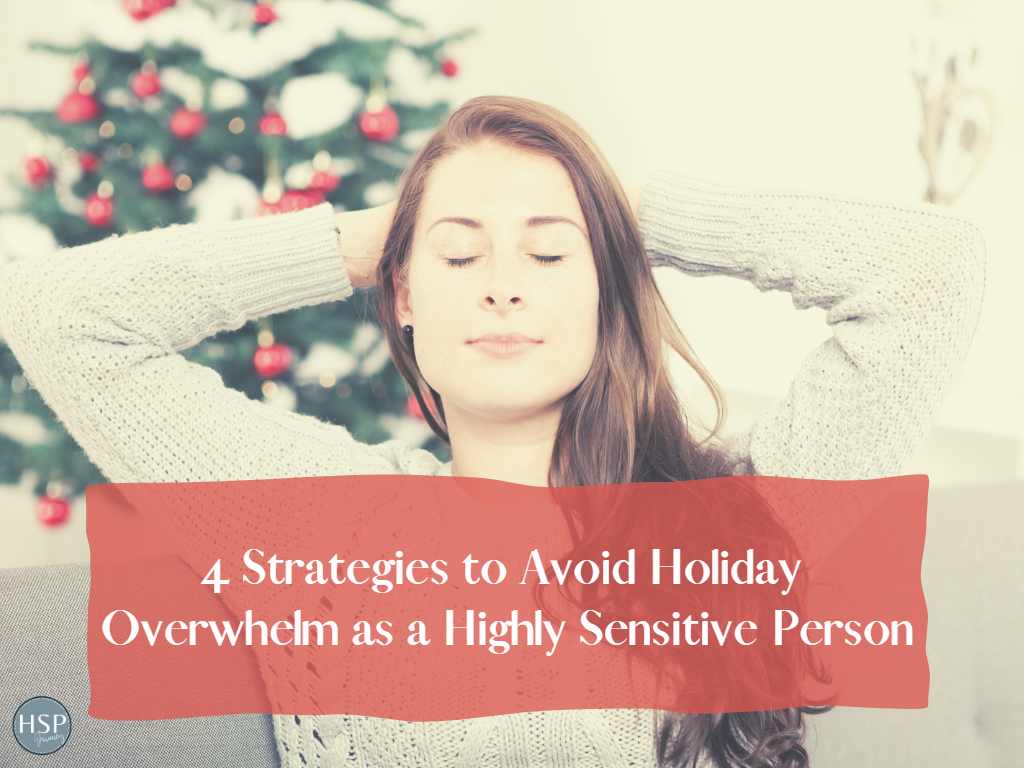Are you wondering how to avoid holiday overwhelm as a Highly Sensitive Person (HSP)? As a young woman who didn’t fully understand what it meant to be an HSP, my way of coping was to embrace my inner grinch. It’s going to be so stressful, I would think, so much commotion, so many demands, so many disappointments.
Mind you, this dread had nothing to do with my circumstances. I’ve been privileged to spend holidays with loving family and friends, abundant food and gifts, and plenty of opportunities for cheer. My attitude was the result of the holiday overwhelm I felt every year.

Table of Contents
And it’s no wonder that highly sensitives suffer from the demands of the holiday season. The holidays bring so many things that place demands on our nervous systems: Extra social events, myriad obligations (real and perceived), changes to schedules, and, can I just say, SO. MUCH. SENSORY. OVERLOAD.
As I’ve discovered more about how I’m wired as an HSP—my need to have quiet time alone to recharge, my limits on how much I can give to others, and how much I take on their emotions—I’ve learned how to reduce my holiday stress. For me, it boils down to two broad strategies:
Prioritize what’s meaningful.
Manage holiday expectations.
Let me explain how these four holiday overwhelm strategies come together to make the holidays less overwhelming:
Strategy #1 – Prioritize to Manage Holiday Overwhelm
When I was younger, I tried to do everything the holidays had to offer. Every party, every family tradition, every community event. I ran myself ragged and could hardly enjoy any of it because I was stressed and constantly overstimulated.
Trying to do everything simply is not sustainable. This is true for everyone, but as highly sensitive people, we are especially vulnerable to burning out if we don’t make time for calming our minds and bodies.
Prioritizing means being honest with yourself and others about what is most important to you about the holidays. Make a plan to be sure that those things are central to how you spend the season. For example, if you love your family tradition of gathering to bake dozens of cookies, set that time aside and don’t try to also cram in a visit to the holiday light show on the same evening.
Although you’ll have to consider how to blend your priorities with those of your family and friends, remember that your needs and feelings matter, too. Like the idea of putting on your own oxygen mask first, prioritizing your holiday wishes can help you bring a relaxed, joyful presence to everyone’s celebrations.
Strategy #2 – Curate Meaning to Manage Holiday Overwhelm
HSPs tend to have a strong drive to create meaning and purpose in their lives, and the holiday season is no exception. We’re likely to feel put off by mindless consumerism, over-eating, and drinking too much. We want our holiday celebrations to matter, not just entertain us.
Why are you celebrating the holidays? It can be easy to run on autopilot and forget. You may have a variety of religious, spiritual, and secular beliefs and practices that give meaning to this season. Journaling can help you clarify what you believe and value at this point in your life.
With that clarity of mind, you can set intentions to make your holiday observances meaningful to you and your loved ones. Being clear on your “why” makes it easier to implement the “what” and “how” of the holidays.

Looking for an HSP-Trained coach to help you align your life with your priorities?
Through my Highly Sensitive Person (HSP) certification with the Nickerson Institute, as well as being an HSP, I offer HSP coaching to develop specific goals around your HSP needs. We HSPs frequently deal with anxiety and overstimulated nervous systems that prevent us from achieving peace and attaining our life goals. HSP coaching with me includes a detailed review of your sensitivities and a mutually-desired plan for growth and management of this superpower to shift negativity and begin seeing yourself as the hero of your own story. (Affordable monthly coaching begins at $150/month.)
Strategy #3 – Manage Expectations to Manage Holiday Overwhelm
The downside to how HSPs want to create meaningful experiences is that we can set up unattainable expectations for ourselves and others (can I get an AMEN?). We might be prone to this trap if we have a history of perfectionism, people-pleasing, sacrificing ourselves, and struggling to say “no” to others.
I’ve learned the hard way that setting unrealistic expectations fuels the overwhelm of the holidays and leaves me feeling bad about myself. I try to get better each year at managing my expectations of myself. By prioritizing what is most meaningful to me, I recognize that I won’t be able to do everything. And that is fine with me. I can accept the need to decline a dozen invites to community events so that we set aside a long evening to leisurely attend a single event that my family and I are especially looking forward to this year.
Along with managing my expectations of myself, I’ll help others understand what they can expect of me and my family. We’ve let our families know what cookies we’ll be contributing to the festivities, so they know what to expect of us. There have been conversations about gift-giving based on our budget and the extent to which we wish to focus on shopping. Our family and friends know when we’ll be having immediate family time (Christmas Eve, Christmas morning) and when we’re open to social gatherings.
Setting expectations with others can be difficult for highly sensitive people. We are likely to empathize deeply with the disappointment or demands of other people. It is important to respond with empathy and compassion to others, but equally important to protect our boundaries so that we are taking care of our needs and honoring our preferences.

Strategy #4 – Have a Gentle Spirit Toward Yourself as an HSP During the Holidays
We can take responsibility for how we move through the holidays, but we need to accept that expectations will be placed on us that we will not meet. The world is not going to revamp the holidays to match the preferences of highly sensitive people. You can choose to be kind to yourself and others when the season feels overwhelming.
No matter what your beliefs are, the winter holidays represent a season of hope, love, and connection. They were never meant to be a time to burn yourself out or end up feeling resentful, guilty, and pressured.
Allow yourself and others to experiment with how to make the holidays more peaceful, meaningful, and enjoyable. Bring a gentle spirit to the season. As an HSP, this is a gift that you bring to the world.
How do I know if I’m a Highly Sensitive Person (HSP)?
This is a great question. Many people who are highly sensitive feel that they were not understood as children. They were frequently told they were too sensitive or cried too often. You can reference our list of HSP quizzes to see how you score and this can inform whether or not you are a Highly Sensitive Person.
Be sensitive, be free
*This post contains affiliate links and I will be compensated if you make a purchase after clicking on my links*





[…] tend to have a more active emotional response to situations, which can also contribute to feeling overwhelmed. They may feel more deeply affected by negative emotions, such as sadness or anxiety, and may need […]